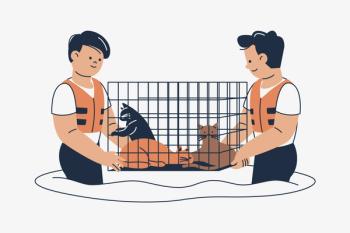
Shelters too quick to label dogs pit bulls, study finds
UF investigation highlights potentially dangerous implications of labeling shelter animals pit bulls.
Getty ImagesA study by Julie Levy, DVM, PhD, professor of shelter medicine at the University of Florida College of Veterinary Medicine, suggests that veterinarians and shelter staff expected to guess canine breeds on appearance alone may be creating an array of potentially negative consequences for dogs-especially those labeled as “pit bulls.” The study, recently published in
“Unlike many other things people can't quite define but ‘know when they see it,' identification of dogs as pit bulls can trigger an array of negative consequences, from the loss of housing to being seized by animal control to the taking of the dog's life,” Levy says in a UF release. Further, the term “pit bull” is not a recognized breed but a generalized term derived from the American Staffordshire terrier, the Staffordshire bull terrier or the American pit bull terrier. The term is often associated with assumptions that certain breeds are more aggressive or dangerous than others.
“In the high-stakes world of animal shelters, a dog's life might depend on a potential adopter's momentary glimpse and assumptions about its suitability as a pet,” Levy says. “If the shelter staff has labeled the dog as a pit bull, its chances for adoption automatically go down in many shelters.”
Unreliable identification
After 16 shelter staff members, including four veterinarians at four shelters, evaluated 120 dogs, researchers took blood samples from all the dogs to compare DNA findings with the participants' assessments. “We found that different shelter staffers who evaluated the same dogs at the same time had only a moderate level of agreement among themselves,” Levy says.
Depending on the assessor, dogs with pit bull heritage breed DNA were identified only 33 to 75 percent of the time. Yet researchers found dogs lacking any genetic evidence of relevant breeds were labeled as pit bull-type dogs up to 48 percent of the time.
“Essentially we found that the marked lack of agreement observed among shelter staff members in categorizing the breeds of shelter dogs illustrates that reliable inclusion or exclusion of dogs as ‘pit bulls' is not possible, even by experts,” Levy says. “These results raise difficult questions because shelter workers and veterinarians are expected to determine the breeds of dogs in their facilities on a daily basis. Additionally, they are often called on as experts as to whether a dog's breed will trigger confiscation or regulatory action. The stakes for these dogs and their owners are in many cases very high.”
Levy says shelters and veterinary clinics are better off entering “mixed breed” or “unknown” in their records unless the actual pedigrees are available when assessing animals. Further, she says despite the genetic traits and variants found in any dog breed, the behavior of any individual dog is impossible to predict.
Rather than legal restrictions based on dogs' appearance, the public would be better served by reducing risk factors for dog bites such as supervising children, recognizing canine body language, avoiding an unfamiliar dog in its territory, neutering dogs and raising puppies to be social companions, Levy says.
Newsletter
From exam room tips to practice management insights, get trusted veterinary news delivered straight to your inbox—subscribe to dvm360.





